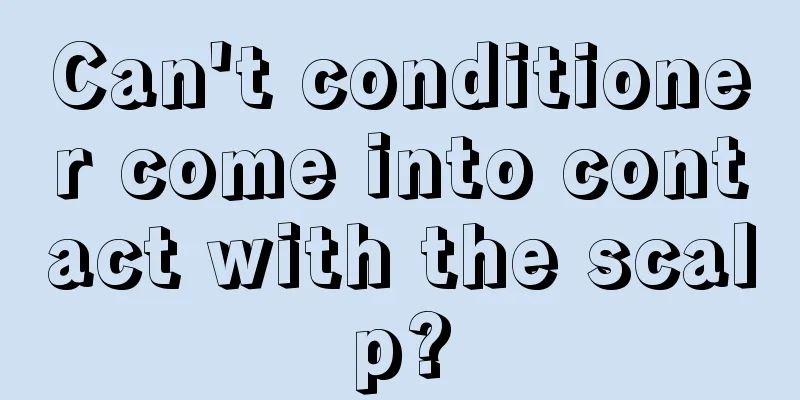Can't conditioner come into contact with the scalp?

|
Each of us has hair. Generally, women's hair is usually longer than men's. Hair needs regular care. Most people will apply conditioner after washing their hair. Conditioner can help us nourish our hair to a great extent, making hair smoother and healthier. However, most people have misunderstandings when using conditioner, allowing the conditioner to come into contact with the scalp. Shouldn't conditioner come into contact with the scalp? Conditioner is mainly used for hair care. Applying conditioner directly on the scalp can easily damage the scalp skin, causing over-nutrition of scalp skin cells, affecting the health of the scalp and increasing the oil production of the scalp. Using this method to wash your hair for a long time can easily cause the hair quality to deteriorate. No-rinse type cannot be touched Generally speaking, there are two types of conditioners, one is applied to the hair after shampooing and then rinsed off later, and the other is a leave-in conditioner, which is used when the hair feels dry or frizzy without rinsing. The former can be applied to the scalp, but it must be rinsed thoroughly afterwards to prevent residue. The latter type should not come into contact with the scalp, otherwise it will damage the scalp. Rinse thoroughly after contact The main function of conditioner is to close and repair the hair frizzles, form a protective film on the surface of the hair, prevent hair damage, and make it smooth. However, if the conditioner is washed off thoroughly, it will not cause any adverse effects on the scalp. But if it is not washed off thoroughly, it will clog the pores and make the scalp itchy. If things go on like this for a long time, the quality of your hair will deteriorate. Oily hair must not touch Conditioner is mainly used for hair care. Applying conditioner directly to the scalp can easily damage the scalp skin, causing over-nutrition of scalp skin cells, affecting scalp health, and even leading to increased oil production on the scalp. The scalp itself secretes some oil. If you put conditioner on the scalp, it will make the scalp greasy. Therefore, girls with oily hair should try not to let their scalp come into contact with conditioner, otherwise their hair will soon appear greasy and heavy after washing. Where should you apply conditioner? Use it on the hair 5 to 8 cm away from the scalp after shampooing. The ends of the hair are the parts that lack nutrition and are severely damaged, so the conditioner should be applied to the middle and ends of the hair to truly nourish the hair. The scalp is a very fragile part. Whether it is a rinse-off conditioner or a leave-in conditioner, it is generally not recommended to let the conditioner come into contact with the scalp. . The harm of hair conditioner contacting scalp Prone to hair loss The ingredients in conditioner (especially silicone) tend to remain on the scalp. The residual conditioner will clog the hair follicles, easily causing fat particles on the scalp and causing hair loss. Therefore, if conditioner accidentally comes into contact with the scalp, wash it thoroughly to protect the scalp skin. Dandruff When using conditioner on oily hair, you must be careful. Using too much conditioner will cause dandruff to grow. When using it, just apply it to the drier ends of the hair, and use as little conditioner as possible on the scalp. |
<<: How to choose beef brisket
>>: The effects and hazards of hair conditioner
Recommend
What is hydrophobia? What is the fear of water?
Hydrophobia is actually rabies, which is a diseas...
What is the reason for frequent headaches after thyroid cancer surgery
Frequent headaches after thyroid cancer surgery m...
What is the principle of Lingzhi in treating insomnia
Ganoderma lucidum is a relatively precious Chines...
How to clean a refrigerator
Now every family has a refrigerator, and the refr...
Can Cephalexin and Aqi be used together
There are various medicines in people's daily...
What to do if there are blue spots on the face
In our lives, many people will find that they hav...
CT can detect nasopharyngeal cancer. What should we pay attention to in our daily diet?
As a common disease in life, nasopharyngeal carci...
How to use medicine for malignant teratoma
How to use medicine for malignant teratoma? Terat...
How to slim down the face if there is too much fat on it
Some women have very good figures except that the...
How to effectively treat wide gaps between teeth
If the gaps between teeth are wide, then you need...
What is the quick trick to cure cough
Cough is a very common minor illness, but if left...
Is it okay not to remove the thyroid cancer?
Thyroid cancer must be treated without resection....
Why does my lower back hurt when I sleep lying down?
Female friends are most likely to suffer from low...
Will I get fat if I don't eat in the morning?
Breakfast can be said to be the most important me...
How to use soap nuts
We can take soap beans as a medicinal material or...









